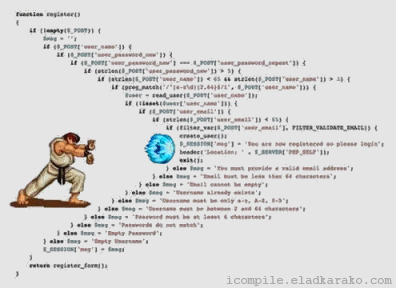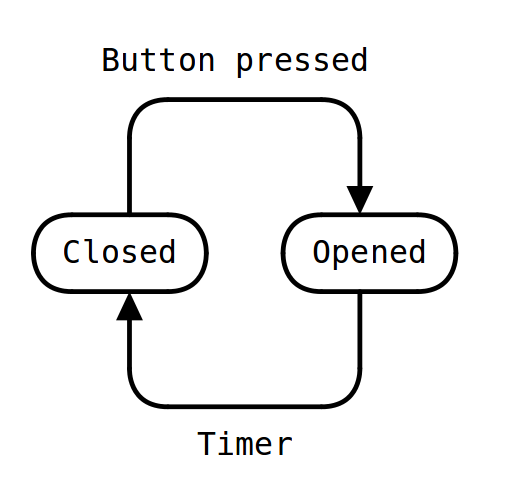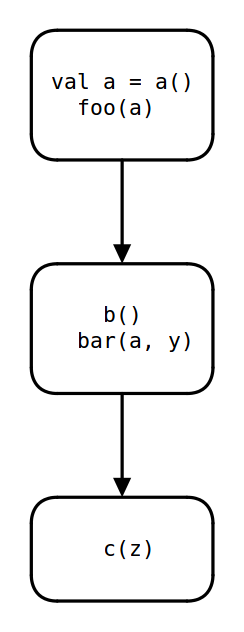Going
Async
with Kotlin
(use <space>/<s-space> to navigate)
- It has two types of functions
- There are red functions
- There are blue functions
- There are no colorless functions
Imagine you are learning
a new programming language...
// Syntax
blue^foo()
red^bar()Rules:
- You can call a blue function from red one
- You can call a blue function from blue one
- You can call a red function from red one
- You can't call a red function from blue one
blue^foo() {
blue^doom // OK
}
blue^foo() {
...
red^bar() // NOT OK
...
}
When you write a function you should choose its color
fun doStuff() {
val bitmap = red^doRedStuff()
blue^doBlueStuff()
}
A: It must be red because it calls another red function
Q: Which color is this function?
One more rule:
- Red functions are more painful to work with
More and more functions become red in your code
That's are problem because red functions are more painful
Q: Would like to code in a language like that?
What if I told you...
you program
on a language
like that
every day?

Red are asynchronous
Blue are synchronous

// You should write loadBitmapInto function
// ..and it should return a result
fun foo(callback: () -> Unit) {
loadBitmap(name: String) { bitmap ->
processBitmap { bitmap ->
callback("it's done!")
}
}
}
- loadBitmap is async
- setBitmap is sync
- ..so if you want to return a value loadBitmapInto should be async
Example - Callbacks

Callback hell
fun foo(callback: () -> Unit) {
val cf = CompletableFuture.supplyAsync { loadBitmap() }
.thenCompose { bitmap -> processBitmap(bitmap) }
.thenAccept(callback)
}
Example - Futures
- Viral
- Not composed well with other language features
- Exceptions (stack)
- Pull / Push
What should we do?
report("before async block")
async<Unit> {
report("before await")
val bitmap = await { loadBitmap("bitmap.bmp") }
report("after await")
// do smth. with bitmap
}
report("after async block")
// logcat
Reporting [before async block] from Thread[main,5,main]
Reporting [before await] from Thread[main,5,main]
Reporting [after async block] from Thread[main,5,main]
Reporting [inside slow call] from Thread[ForkJoinPool.commonPool-worker-1,5,main]
Reporting [after await] from Thread[ForkJoinPool.commonPool-worker-1,5,main]Example - Kotlin 1.1+
fun loadBitmap(name: String): ... {
...
report("inside slow call")
...
val bmp: Bitmap = loadBitmapFromNetwork()
bmp // return
}
report("before async block")
async<Unit> {
report("before await")
val bitmap = await(loadBitmap("bitmap.bmp"))
report("after await")
imageView.setBitmap(bitmap)
}
report("after async block")
suspension point
coroutine
- async/await is just a library
- only language future required is coroutines
Coroutines
- Ruby -- 2010 (fibers)
- Lua -- 2003
- assembly -- 1958
- Many other languages have them including Java (bytecode manipulation)
Coroutines in Kotlin are implemented through finate state machines
Coroutine is a function that can be paused and resumed
Finite
State
Machines



val a = a()
val y = await(foo(a)) // suspension point
b()
val z = await(bar(a, y)) // suspension point
c(z)
Kotlin (1.1) compiles coroutines to FTMs
val a = a()
val y = await(foo(a)) // suspension point
b()
val z = await(bar(a, y)) // suspension point
c(z)class <anonymous_for_state_machine> implements Continuation<...> {
// The current state of the state machine
int label = 0
// local variables of the coroutine
A a = null
Y y = null
void resume(Object data) {
if (label == 0) goto L0
if (label == 1) goto L1
if (label == 2) goto L2
else throw IllegalStateException()
L0:
// data is expected to be `null` at this invocation
a = a()
label = 1
await(foo(a), this) // 'this' is passed as a continuation
return
L1:
// external code has resumed this coroutine passing the result of await() as data
y = (Y) data
b()
label = 2
await(bar(a, y), this) // 'this' is passed as a continuation
return
L3:
// external code has resumed this coroutine passing the result of await() as data
Z z = (Z) data
c(z)
label = -1 // No more steps are allowed
return
}
} Implement your own async/await
fun asyncFun(
coroutine c: FunController.() -> Continuation<Unit>
): Unit {
val controller = FunController()
c(controller).resume(Unit)
}
- special keyword coroutine
- coroutine accepts controller as this
- coroutine implements Continuation
async
@AllowSuspendExtensions
class FunController() {
suspend fun <V> awaitFun(f: () -> V, machine: Continuation<V>) {
// ....
}
}
- function marked with suspend receives Continuation object as last argument
- controller determines which suspending function are available
interface Continuation<in P> {
fun resume(data: P)
fun resumeWithException(exception: Throwable)
}
await
@AllowSuspendExtensions
class FunController() {
val executorService: ExecutorService = Executors.newFixedThreadPool(5)
suspend fun <V> awaitFun(f: () -> V, machine: Continuation<V>) {
executorService.execute {
try {
val v = f() // blocking
machine.resume(v)
} catch (e: ExecutionException) {
machine.resumeWithException(Exception(e.cause))
}
}
}
}
Background job - impl
report("before async")
asyncFun {
report("before await")
val result = awaitFun(::slowFun)
report("after await; result is $result")
}
report("after async")
D/REPORT: before async [on Thread[main,5,main]
D/REPORT: before await [on Thread[main,5,main]
D/REPORT: after async [on Thread[main,5,main]
D/REPORT: inside slow function [on Thread[pool-1-thread-1,5,main]
D/REPORT: after await; result is 42 [on Thread[pool-1-thread-1,5,main]Background job - usage
val githubApi = GitHubRetrofit().builder
val companies = listOf("yalantis", "google")
asyncFun {
val repos = companies.flatMap { company ->
awaitFun({
githubApi.getOrgRepos(company).execute().body()
})
}
}
Background job - usage 2
typealias Wrapper = (() -> Unit) -> Unit
fun asyncFun(
wrapper: Wrapper? = null,
coroutine c: FunController.() -> Continuation<Unit>
): Unit {
val controller = FunController(wrapper)
c(controller).resume(Unit)
}
@AllowSuspendExtensions
class FunController(val wrapper: Wrapper?) {
val executorService: ExecutorService = Executors.newFixedThreadPool(5)
suspend fun <V> awaitFun(f: () -> V, machine: Continuation<V>) {
executorService.execute {
try {
val v = f()
wrapIfNeeded { machine.resume(v) }
} catch (e: Exception) {
wrapIfNeeded { machine.resumeWithException(Exception(e.cause)) }
}
}
}
private fun wrapIfNeeded(function: () -> Unit) {
wrapper?.invoke(function) ?: function()
}
}
Continue on main thread - impl
val handler = Handler(mainLooper)
val wrapper: Wrapper = {
handler.post(it)
}
report("before async")
asyncFun(wrapper) {
report("before await")
val result = awaitFun(::slowFun)
report("after await; result is $result")
}
report("after async")
Continue on main thread - usage
D/REPORT: before async [on Thread[main,5,main]
D/REPORT: before await [on Thread[main,5,main]
D/REPORT: after async [on Thread[main,5,main]
D/REPORT: inside slow function [on Thread[pool-1-thread-1,5,main]
D/REPORT: after await; result is 42 [on Thread[main,5,main] report("before async")
asyncFun(null) {
report("before await")
val (photo, profile) = awaitFunPair(::loadPhoto, ::loadProfile)
report("after await")
}
report("after async")
Several jobs parallelly - usage
D/REPORT: before async [on Thread[main,5,main]
D/REPORT: before await [on Thread[main,5,main]
D/REPORT: after async [on Thread[main,5,main]
D/REPORT: job B started [on Thread[pool-1-thread-1,5,main]
D/REPORT: job A started [on Thread[pool-1-thread-2,5,main]
D/REPORT: job A ended [on Thread[pool-1-thread-2,5,main]
D/REPORT: job B ended [on Thread[pool-1-thread-1,5,main]
D/REPORT: after await suspend fun <F, S> awaitFunPair(first: () -> F,
second: () -> S,
machine: Continuation<Pair<F, S>>) {
val firstTask = FutureTask(first)
val secondTask = FutureTask(second)
executorService.execute(secondTask)
executorService.execute {
try {
firstTask.run() // blocking
val result = Pair(firstTask.get(), secondTask.get()) // blocking
wrapIfNeeded { machine.resume(result) }
} catch (e: ExecutionException) {
wrapIfNeeded { machine.resumeWithException(Exception(e.cause)) }
}
}
}
Several jobs parallelly - impl

typical quiz app
asyncFun(wrapper) {
while(true) {
val timer = timer(2000)
val answer = userAnswer()
val result: FutureTask<*> = awaitFunAny(timer, answer)
when(result) {
timer -> showMsg("You're too slow!")
answer -> {
val a: Answer = answer.get()
if (isRightAnswer(a)) showNextQuestion()
else { showMsg("You lost"); break }
}
else -> throw IllegalStateException()
}
}
}
Wait for the first job - usage
suspend fun awaitFunAny(vararg fs: FutureTask<*>, machine: Continuation<FutureTask<*>>) {
val ecs: ExecutorCompletionService<FutureTask<*>> =
ExecutorCompletionService(executorService)
fs.forEach { f ->
ecs.submit { f.run(); f } // blocks each thread and returns task itself
}
executorService.execute {
val f = ecs.take() // blocks
fs.forEach { if (it != f) it.cancel(true) }
wrapIfNeeded { machine.resume(f.get()) }
}
}
Wait for the first job - impl
What's not covered
- async blocks can return values (handleResult, handleException)
- it's not only about async/wait
- generators
- channel-based concurrency
- scoped continuations


Links
- What Color is Your Function? http://journal.stuffwithstuff.com/2015/02/01/what-color-is-your-function/
- Kotlin Coroutines Description https://github.com/Kotlin/kotlin-coroutines/blob/master/kotlin-coroutines-informal.md
- Kotlin Coroutine Example Libraries https://github.com/Kotlin/kotlinx.coroutines
- Goroutines https://tour.golang.org/concurrency/1
- Clojure core.async https://github.com/clojure/core.async
- Scoped continuations http://blog.paralleluniverse.co/2015/08/07/scoped-continuations/
@defhlt